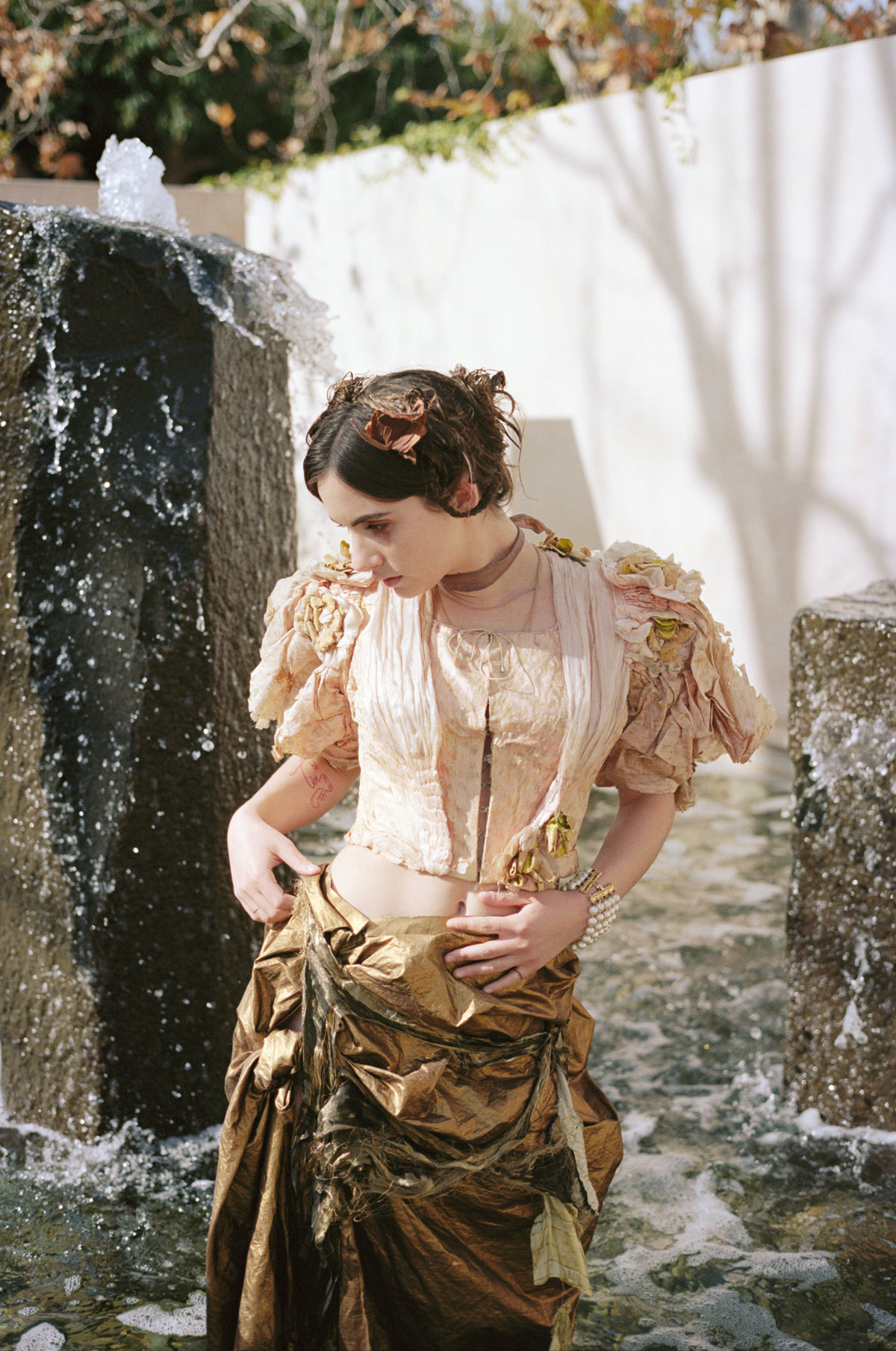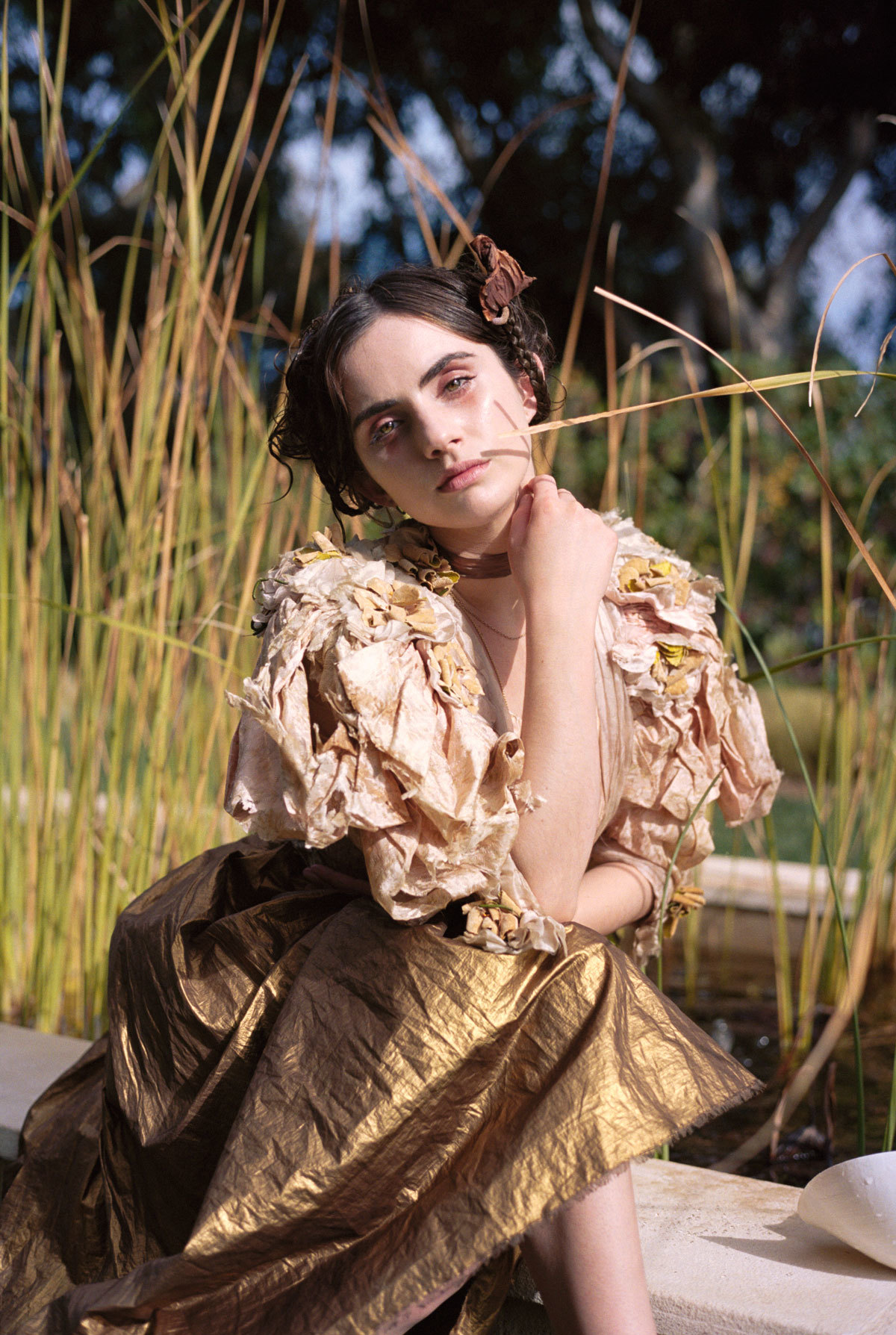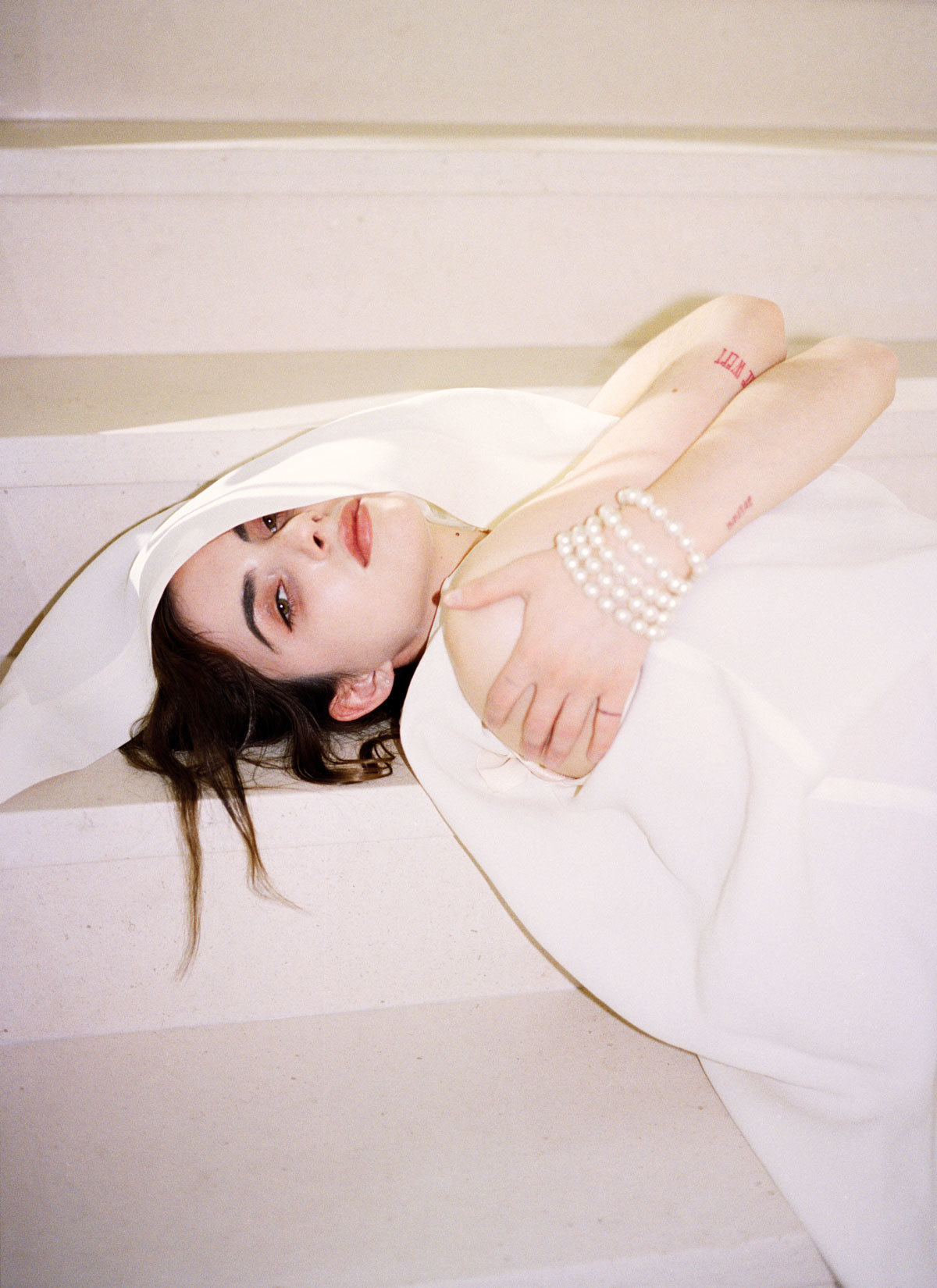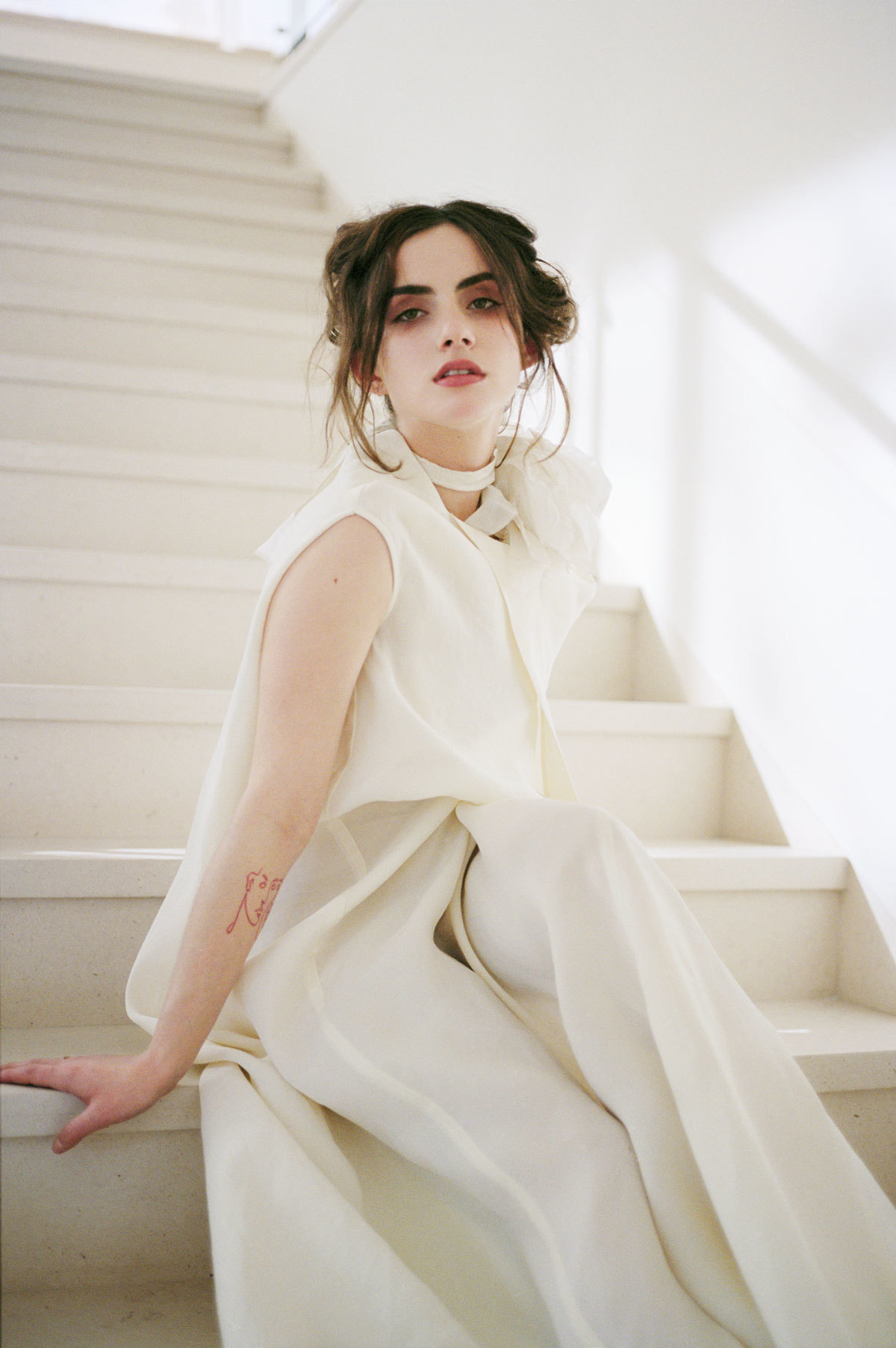“I prefer to live in my own fantasy world,” muses Zoë Sidel, “it’s so much nicer.” Born in this world on October 23, 1994, Zoë has never truly felt like she fit in. Her parents, actress Rosanna Arquette and restaurateur John Sidel, divorced when Zoë was five years old, and she’s lived with her mother in Los Angeles ever since, where she attended the famous Esalen Institute, a spiritual sanctuary in Big Sur in which artists and philosophers would hang out in the 60s. A member of the great Arquette acting dynasty (her aunt is the Oscar-winning Patricia Arquette), a flare for theatrics has always been in Zoë’s blood. “My whole family grew up with these acting technique games and would often play with me,” she muses, “I was always playing different characters with my mom. We’d pretend we were different people from different time periods.”
When she was 15 years old, Zoë began studying the Meisner technique, whereby actors must react instinctively to their surroundings. “You really need to disrobe yourself and shed all your skin to reveal the most horrible part of yourself,” she explains. For someone who has always felt at odds with her own skin, this idea of disrobing was one that resonated deeply. “I hated my body, that I couldn’t look the way other girls did. I’m very short and stubby. I used to think, “Why won’t my legs stretch?” It was this disconnect with her own self image which led to Zoë turning down her first real acting role — the lead in Gia Coppola’s debut film, Palo Alto, opposite her ex-boyfriend, Jack Kilmer. She’d previously appeared in Sofia Coppola’s The Bling Ring, but this, she felt, was different. “I had my reservations,” she recalls. “Being in front of a screen and not being in control of what I looked like was really scary. I didn’t feel like I was ready for that.” Zoë turned the role down, choosing to focus on her schoolwork instead.

Ultimately it was through her love of fashion that Zoë was finally able to feel at ease with her own image. “Because I didn’t feel good in my own skin, I wanted to feel good in the clothes I was wearing.” Like something out of some wonderfully gothic fairy tale, Zoë’s style is totally otherworldly: velvet ribbons and vintage slips, Edwardian lace with ivory veils, and Christmas jewelry worn all year round. “People always ask me, ‘Where are you going? Is there a Renaissance fair on? What’s the occasion?’ I like to wear things that are beautiful, it makes me feel beautiful.” With rosebud lips, mahogany hair, and skin as white as snow, hers is a kind of doll-like beauty that transcends the waxing and waning trends of fashion. “I’m like the child bride,” she laughs, “abandoned at the altar, like Miss Havisham. I have cobwebs in my hair and around my heart.”
Not only does Zoë collect these fantastical pieces, she also creates them as part of her fashion collective, Nautae, which she runs with her two best friends and fellow artists, Arielle Chiara and Darius Khonsary. “We were just messing around,” says Zoë, “cutting up my sheepskin rug and mixing it with weave, or painting latex onto old slips from the 1920s. But now we’ve decided we actually want to make this a real thing.” Tired of the archaic catwalk formula, Zoë’s debut collection will be presented in a series of short plays they wrote themselves. “They’re based on dreams,” she explains. Featuring over 40 looks, the play takes place in New York, this September, and will be cast from a group of diverse kids who don’t conform to mainstream standards of beauty. “I’m so over the generic skinny, tall girl. People don’t like that. I want to see real people, with characters, who aren’t there because of their appearance.” She also plans to make a video with SHOWstudio’s Nick Knight, based around the collection, after he reached out to her over Instagram last year.

Aside from fashioning slips out of hair and latex, and day-dreaming about playing the harp, Zoë spent most of last year working with Ruchira Gupta and her organization, Apne Aap Women Worldwide, which helps the victims of sex slavery in India — a subject she holds very dear to her heart.”I was raped as a child in a domestic situation, I never told anyone my whole life, it destroyed me, ate at me from the inside, and I finally decided to talk about it and get help,” she says. “There’s a lot of shame that comes with being a victim of rape. I want to help these girls find justice, even though I haven’t yet found my own.” Having spoken about it publicly for the first time last year, the response Zoë’s received has been incredible. “Someone reached out to me and said that after they saw my interview, they had the confidence to tell their parents they were raped; I would love to help girls like me find the strength to talk about it. That’s the most important thing, addressing it, lots of people swipe it under the carpet.” As well as girls who have suffered from sexual abuse, Zoë has also spent a lot of time with transgender women, which is something she relates to on a personal level having experienced her aunt Alexis’ transition first hand. “They’re pretty inspiring,” she gushes, “They’re just so fucking confident and more beautiful than most women I know. They put up with a lot of bullshit, a lot of hatred and hostility. I’m really grateful that I’ve been able to meet people who have had the courage to make changes that they’ve made.”
As for the future, Zoë has lots of exciting projects in the pipeline, including lead roles in James Franco’s forthcoming films The Institute, about an asylum in the 1800s, and, Mother, May I Sleep With Danger, in which she plays a lesbian vampire queen. Is fame something she aspires to? “I think fame is a really funny thing,” she concedes, “It depends on how you decide to take advantage of that attention. I really respect people who use their fame to address social, political or environmental issues; that’s really important.” With the world already at her feet, the future looks very bright for this one.


Credits
Text Tish Weinstock
Photography Daria Kobayashi Ritch
Zoë wears dress Rick Owens. Jewelry model’s own.
